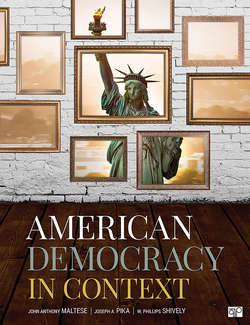Читать книгу American Democracy in Context - Joseph A. Pika - Страница 35
На сайте Литреса книга снята с продажи.
Freedom and Individualism
ОглавлениеIn addition to fairness, Americans also regard freedom and individualism as important values. Individualism is the belief that people should be able to rely on themselves and be free to make decisions and act freely, with as little governmental or other societal control as possible. We value highly those who think for themselves. In 2016, for example, Donald Trump presented himself in the presidential campaign as a blunt “straight talker” who was not bound by ordinary rules of politeness. When John F. Kennedy wrote a book titled Profiles in Courage, he featured public officials who had taken stands that went against their parties or the opinions of their constituents, doing instead what they thought was right. Generally, Americans have always liked rebels and nonconformists, those who “march to a different drummer” or “color outside the lines.”
individualism The belief that people should have freedom to make decisions and act with as little government intervention or other control as possible.
The value of individualism has its roots in colonial times. Many of the early settlers from England and Scotland—Catholics in Maryland, Quakers in Pennsylvania, and Puritans in New England—had fled to the colonies to escape religious persecution and discrimination. Other colonists, such as convicted criminals and poor farmers, had emigrated to escape punishment and to start over after having their land confiscated. On some level, all of these colonists had sought freedom from government control.
Over the last two centuries, many waves of immigrants—including but not limited to Asians, Eastern Europeans, and Latin Americans—arrived in this country with little except their self-sufficiency and their willingness to work. Their primary goal was to build good lives for themselves and their children. Their experience of relying on their own labor and on their own determination to succeed reinforced the traditional American values of individualism and self-reliance.
For many years, America was considered a “frontier society,” and this status encouraged the nation’s disposition toward individualism.15 Until the twentieth century, open land always beckoned. On the frontier, government ruled with a relatively loose hand and individuals had a good deal of independence. Indeed, this independence was one of the appeals of the frontier.
The United States’ status as a frontier society—and stories of the “Wild West” that made it back east—contributed to Americans’ view of the nation as one that prized freedom and individualism.
The New York Historical Society / Getty Images
Finally, an important current in political thought that emerged around the time of the American Revolution further contributed to this affinity for individualism: classical liberalism. According to classical liberalism, a country’s highest goal should be to allow all individuals in the nation to develop their intellectual and moral capacities to the fullest by making decisions for themselves rather than having decisions made for them by others. From this goal, it followed that the right of individuals to make their own decisions should be a basic principle of good societies and proper government. Classical liberalism is obviously different from what we call liberalism today. As we will see later in this chapter, today’s liberalism argues for considerable central control in some areas such as the economy while arguing for individual freedom in others, such as abortion and free speech.
A major voice in classical liberalism at the time was John Locke; his writings influenced both the Declaration of Independence and the American Constitution (see Chapter 2).16 The Bill of Rights, as the first ten amendments of the Constitution are collectively called, enshrines a number of protections for individual choice against government control—protections for freedom of speech, religion, press, and free association as well as protections against abuse by the government in criminal prosecutions.
classical liberalism The doctrine that a society is good only to the extent that all of its members are able to develop their capacities to the fullest and that to encourage this result, government should intervene as little as possible in people’s lives.
rule of law The idea that laws, rather than the whims or personal interests of officials, should determine the government’s actions.
